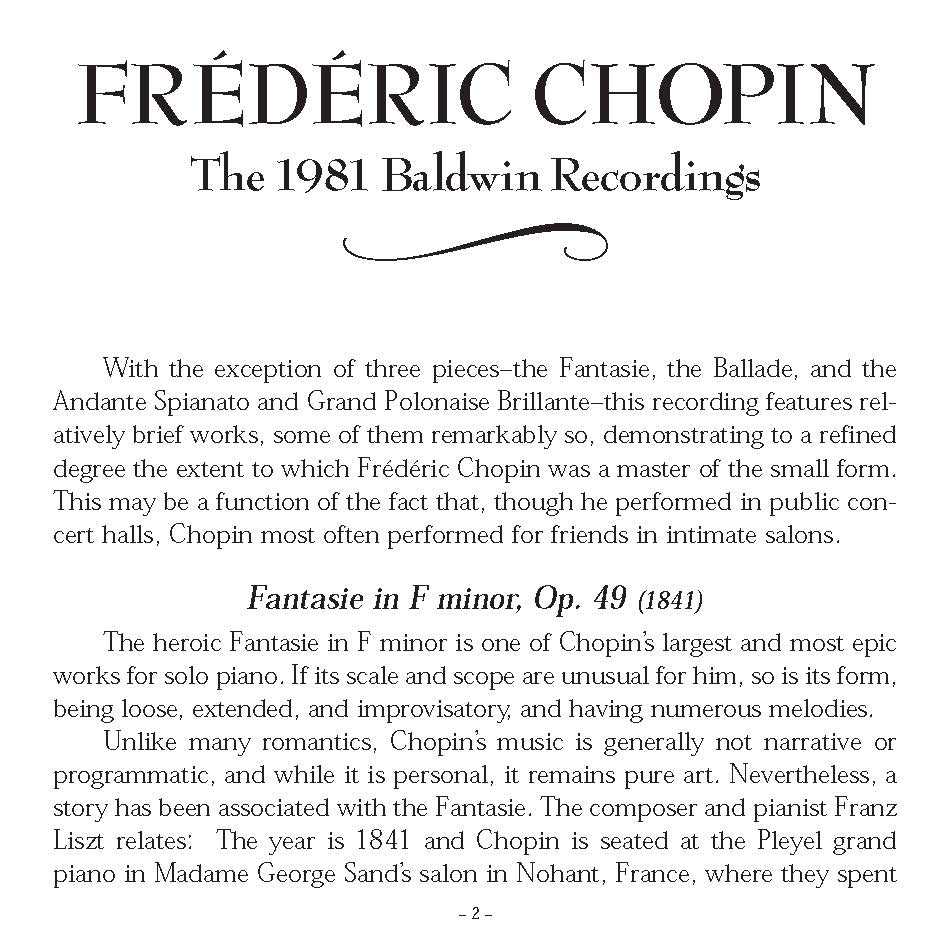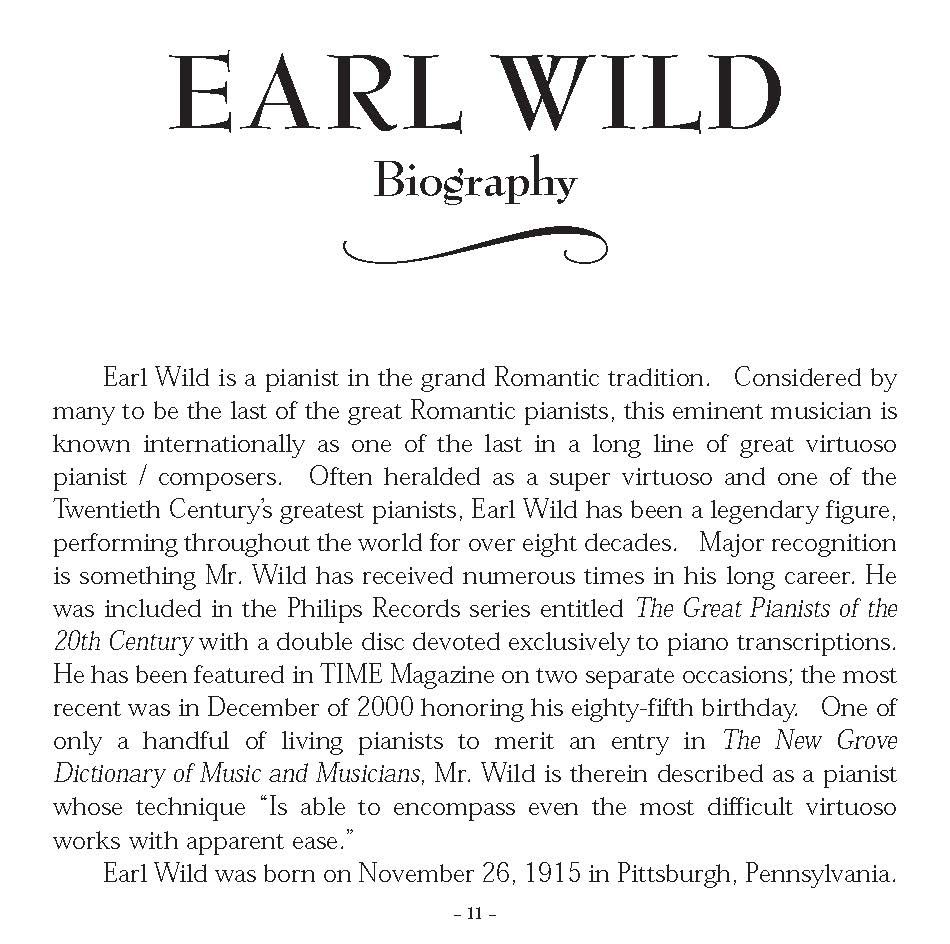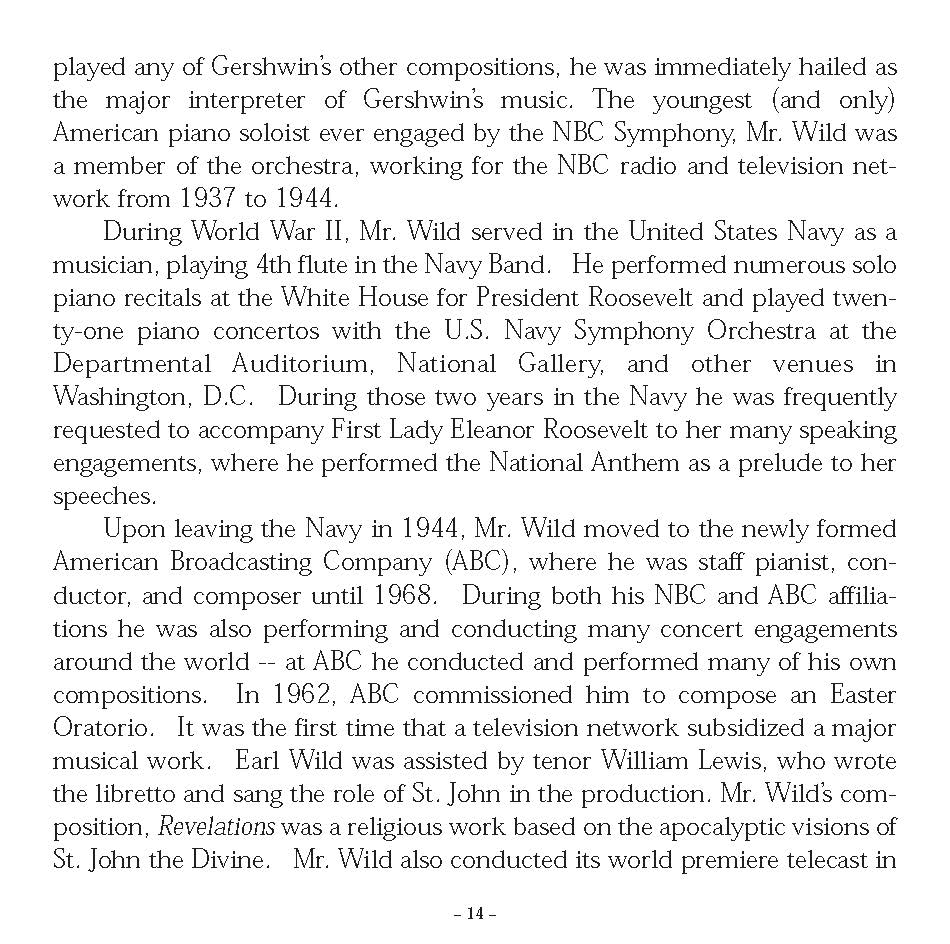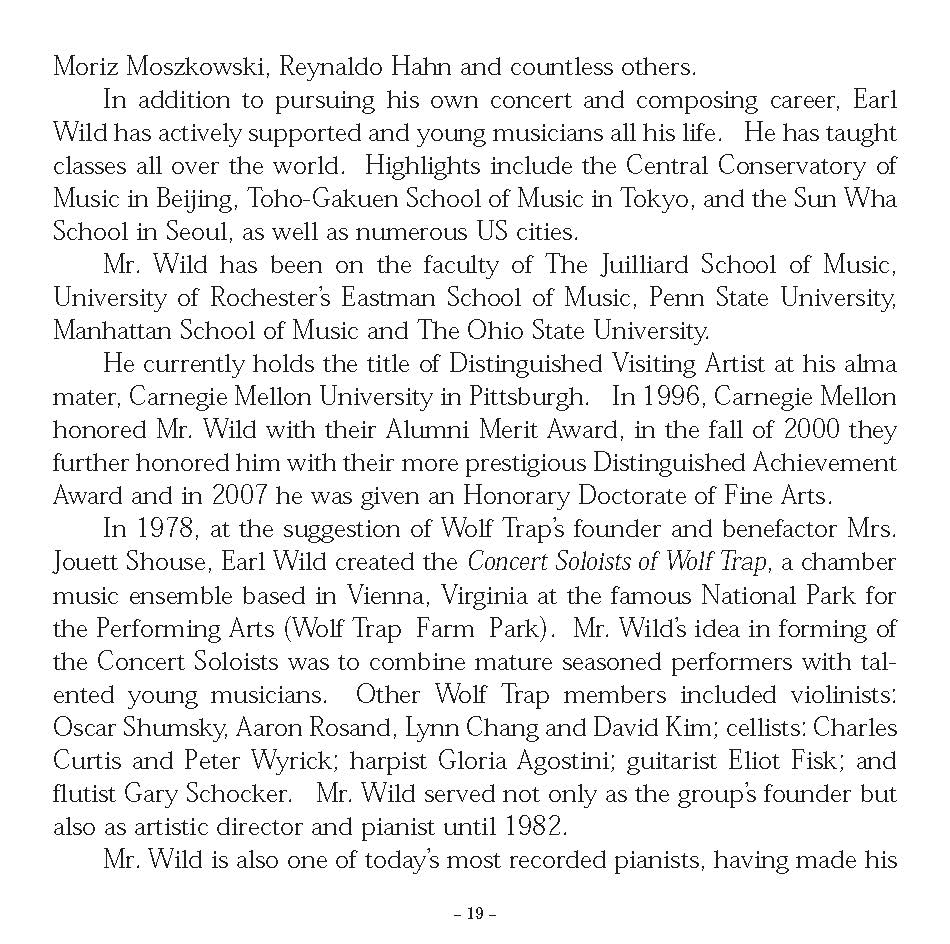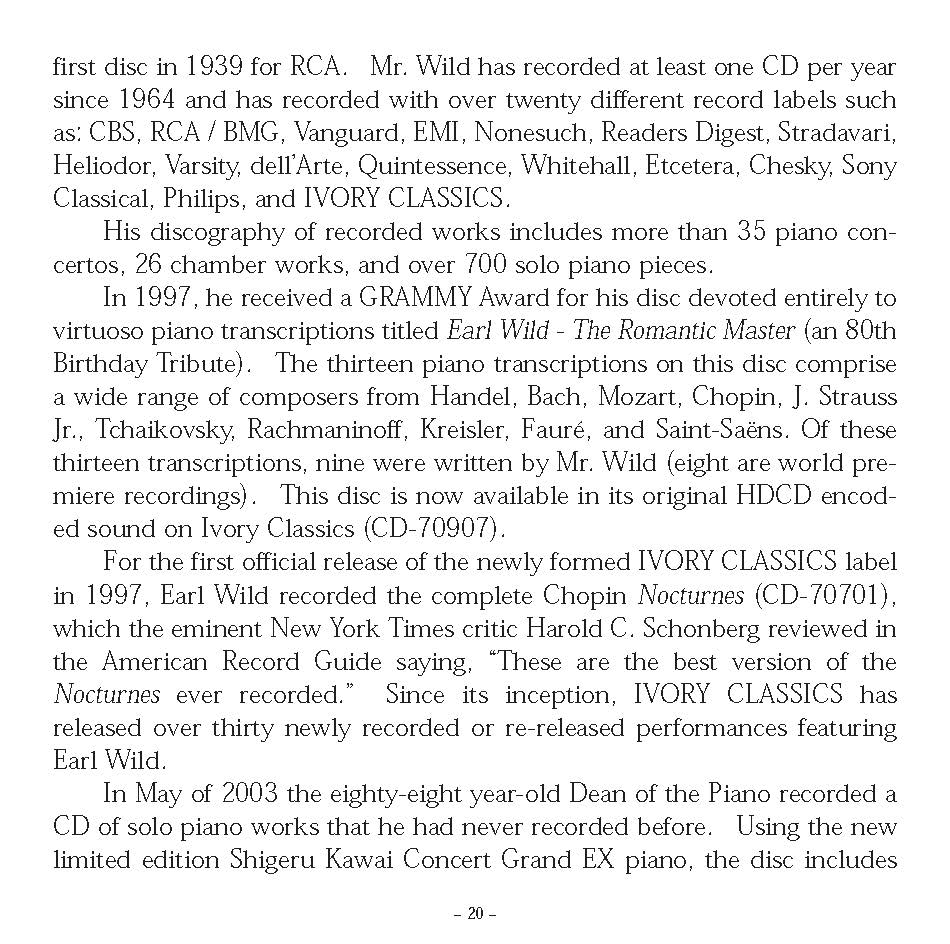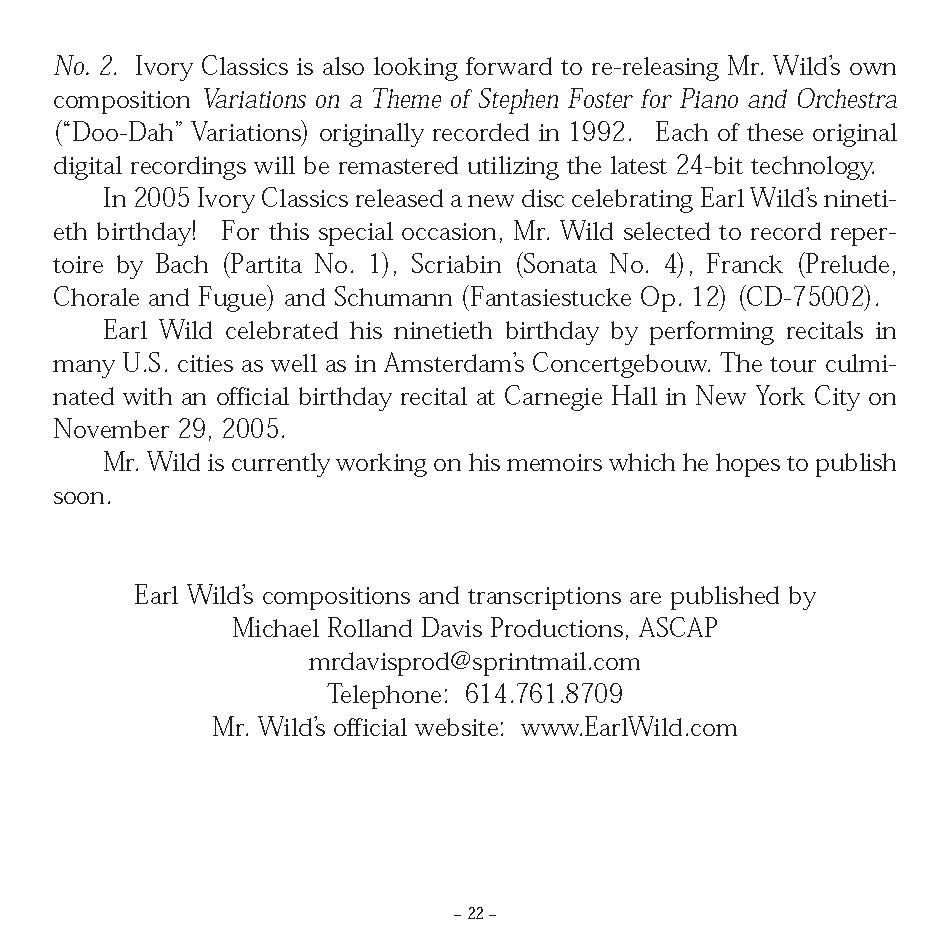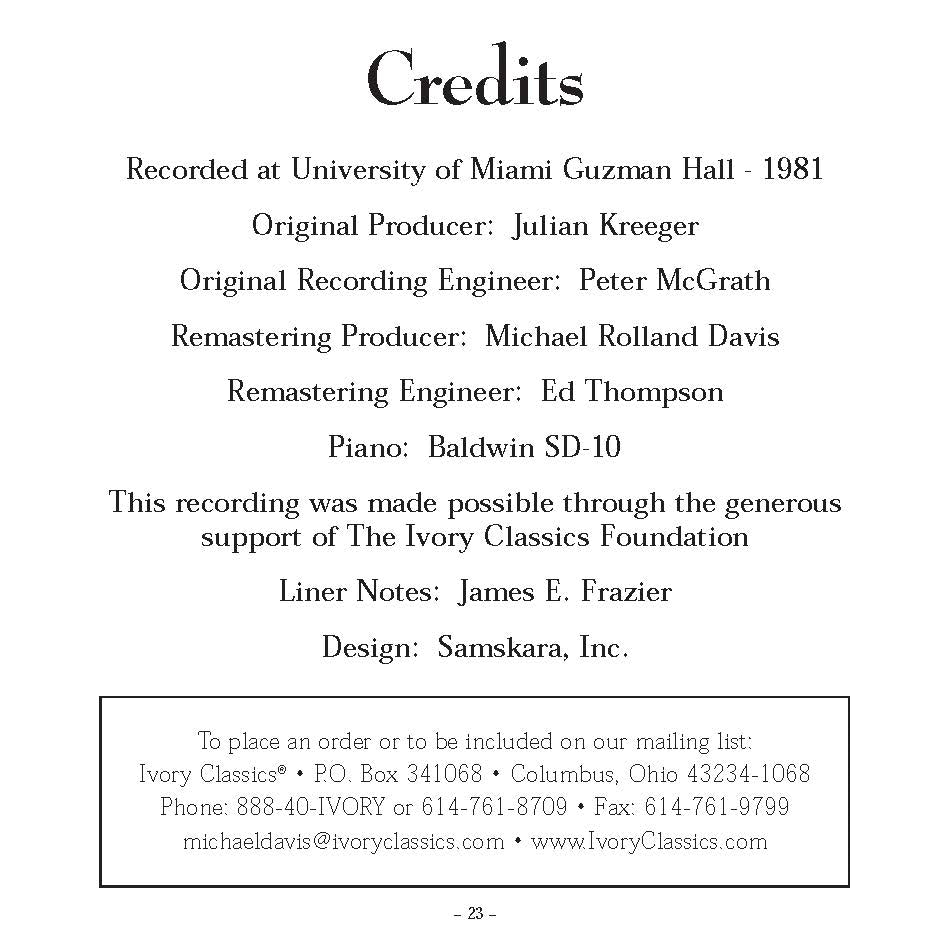Ivory Classics Music
Earl Wild: Chopin The 1981 Baldwin Recordings
Earl Wild: Chopin The 1981 Baldwin Recordings
Couldn't load pickup availability
This exquisite CD of Earl Wild's 1981 Baldwin recordings provides listeners with a historic and timeless experience of Chopin's works. Recorded in brilliant digital stereo sound, it masterfully captures every nuance and dynamic of Wild's performance, creating a powerful and detailed listening experience.
Ivory Classics CD-77002
Earl Wild: Chopin The 1981 Baldwin Recordings
Frederic Chopin (1810-1849):
Piano: Earl Wild
Producer: Michael Rolland Davis
Engineer: Ed Thompson
Recorded at University of Miami Guzman Hall - 1981
Original Producer: Julian Kreeger
Original Recording Engineer: Peter McGrath
Remastering Producer: Michael Rolland Davis
Remastering Engineer: Ed Thompson
Piano: Baldwin SD-10
This recording was made possible through the generous support of The Ivory Classics Foundation
Liner Notes: James E. Frazier
Design: Samskara, Inc.
On CD for the first time, the legendary Baldwin Recordings from 1981. Elegant interpretations. Masterfully performed and recorded by the then sixty-six year old Earl Wild. This all Chopin disc includes the Fantasie, Ballade No. 4, Four Waltzes, Four Nocturnes, Four Preludes, 'Black Key' Etude and the Andante Spinato and Grande Polonaise Op.22.
Disc.Reviews
The title of the disc refers to Earl Wild's association with the Baldwin Piano Company from New York City. They recorded six Baldwin performers on LPs to be given away by their dealers to buyers of a Baldwin piano and not intended for commercial public circulation. For his recording session, in 1981 at the University of Miami, the sixty-six year old Earl Wild used a Baldwin SD-10 piano. The other Baldwin pianists: Jorge Bolet, Ruth Laredo, David Barillan and Gilbert Kalish did not use the same piano for their recordings. Wild recorded an all-Chopin programme, although, there was a separate compilation LP of the performances of all six players entitled 'The Essential Piano Library' given away to libraries. A couple of years later Baldwin allowed Audiofon Records to release Earl Wild's acclaimed Chopin recordings commercially, however, not all the works from the sessions would fit on the LP. This disc from Ivory Classics is the first time that all the Chopin material from Earl Wild's legendary Baldwin Recordings from 1981 at the Guzman Hall has been available on compact disc.
The first work on the sixteen track disc is the Fantasie in F minor in which Wild impressively captures the myriad moods and brings significant insights to the score. Other notable tracks includes the 'Minute' Waltz Op. 64/1 where one can easily imagine an excitable dog chasing his tail. The Waltz in C sharp minor, Op. 64/2 is interpreted as a highly seasoned score bursting briskly with vast resources of energy. Revealed by the soloist as an elegant score the Waltz in A flat major, 'L'Adieu' Op. 69/1 is evocative of models at a haute couture fashion show. In the substantial Ballade No. 4, often regarded as Chopin's greatest Ballade, Wild successfully blends irresistible melody with considerable grandeur. In the celebrated Nocturne in C sharp minor, Op. posth he conveys a convincing dark foreboding. In the highly melodious Nocturne in F sharp major Earl Wild reveals heady emotions that could easily represent a secret love affair. The Etude in G flat major, known as the 'Black Key', one of my favourite Chopin scores, is played with reasonable vigour and a sense of fun bordering on hilarity. Carrying the grand title the Andante Spianato and Grande Polonaise Brillante, Op. 22 is a substantial score in two sections where the Andante Spianato segues into the Grande Polonaise Brillante. With the pastoral character of the lovely Andante Spianato Wild paints the scene of a brook flowing through green meadows. By contrast the Grande Polonaise Brillante contains a copious degree of drama. Earl Wild interprets the Prelude in A major 'The Polish Dance', Op. 28/7 most sedately, losing its dance-like delicacy and charm and bordering on the funereal. The rumbling Prelude in D minor 'The Storm', Op. 28/24 is relentlessly evocative of a wild and stormy night.
Michael Cookson, Music Web.com, Feb. 2008
There's something about an Earl Wild performance, something so sure and authoritative about his way with any given piece of music, you could almost believe his was the only way to play it. Of course, that's nonsense. As any great concert artist will tell you (and Earl would undoubtedly be the first), there's no such thing as a "definitive" performance, any more than there is an "absolute" sound in recorded music.
Having said that, I must add that the Chopin performances reissued on this CD, subtitled "The 1981 Baldwin Recordings" are enough to make one a devout believer to the contrary. The carefully selected program also gives the listener a good impression of the range of Chopin's genius. First, we have the Fantasie in F Minor, more forceful and dramatic and larger in scale than is typical for Chopin. Wild captures the range of moods very well, without overstating the dramatics as many have done, and he also gives the (deceptive) sense of an inspired improvisation that the piece requires.
Next, four Waltzes. First, the "Minute" Waltz in D-flat, Op, 64/1 (and please, folks, minute in the sense of "tiny," not "sixty seconds"), in which the pianist allows the gentle, lilting second subject a little space to dance around. Followed by: the Waltzes in A-flat, Op. 64/3; C-sharp Minor, Op. 64/2; and A-flat, Op. 69/1. All require the interpretive insight to bring out their essential character, without lapsing into caricature. The other element these dance pieces cry out for (and receive) is a judicious use of rubato. And here Wild's unusually strong left hand conveys a strict beat in the bass, allowing the melody the greatest freedom of expression (youthful exuberance, sadness, or nostalgia respectively).
Next, we have the Ballade in F Minor, Op. 52, and there's an unspoken literary "program" in its range in mood between the pastoral and the tragic. Four Nocturnes, all demonstrating the typically simple expressive melody over an arpeggiated accompaniment that marks the genre, reveal Chopin at his most lyrical. The selected pieces – C-sharp Minor, Op. Post.; F Major, Op. 15/1; F-sharp Minor, Op. 15/2; and B Major, Op. 32/1, are among Chopin's most intimate and best-loved.
New Classik Reviews, Jun. 2007
Share


